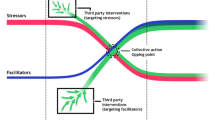Abstract
This article presents a social learning perspective as a means to analyze and facilitate collective decision making and action in managed resource systems such as platforms. First, the social learning perspective is developed in terms of a normative and analytical framework. The normative framework entails three value principles, namely, systems thinking, experimentation, and communicative rationality. The analytical framework is built up around the following questions: who learns, what is learned, why it is learned, and how. Next, this perspective is used to analyze two managed resource systems: Fishery management in Lake Aheme, Benin and water resources management in Gelderland, The Netherlands. To assess platform performance in resource use negotiation, emerging lessons from the case studies are combined with propositions concerning membership of platforms, accessibility of platform meetings, skills and relations of platform members, realization of platforms, and third party facilitation of platform activities.
Similar content being viewed by others
References
Argyris, C. and D. A. Schön (1996). Organizational Learning II. Theory, Method, and Practice. Reading: Addison-Wesley Publishing.
Bandura, A. (1971). Social Learning Theory. New York: General Learning Press.
Checkland, P. (1981). Systems Thinking, Systems Practice. Chichester: J. Wiley and Sons.
Crystal, D. (ed.) (1996). The Cambridge Encyclopedia. Cambridge: Cambridge University Press.
Dangbégnon, Constant (1998). Platforms and Adaptive Resource Management towards Regenerative Practices on Ecosystems. Case Studies from Benin and Burkina Faso. Wageningen: Ph.D. Dissertation Wageningen University and Research Centre.
Department of Communication and Innovation Studies (1997). Interdisciplinary Staff Meeting on Social Learning. Wageningen University and Research Centre, The Netherlands.
Finger, M. and P. Verlaan (1995). “Learning our way out: A conceptual framework for social-environmental learning.” World Development 23(3): 503–513.
Garben, J. and M. Seligman (1980). Learned Helplessness, Theory and Applications. New York: Academic Press.
Groot, A. (1998). “The management of change: Towards a more pluralistic extension approach in Africa,” in KLV and KIT (eds.), Proceedings of International Day of Agriculture, November 6, 1997: The Price of Agricultural Extension. Wageningen: KLV.
Groot, A. and M. Maarleveld (1998). “Demystifying facilitation in participatory interventions.” Working Paper, Wageningen.
Gunderson, L. H., C. S. Holling, and S. S. Light (eds.) (1995). Barriers and Bridges to the Renewal of Ecosystems and Institutions. New York: Columbia University Press.
Habermas, Jürgen (1984, translated by Thomas McCarthy). The Theory of Communicative Action. Boston: Beacon Press.
Hall, C. (1979). A Primer of Freudian Psychology, 25th Anniversary edition. New York: Mentor Books.
Hodgson, G. M. (1988). Economics and Institutions: A Manifesto for a Modern Institutional Economics. Cambridge: Polity Press.
Holling, C. S. (1978). Adaptive Environmental Assessment and Management. Chichester: John Wiley and Sons.
Holling, C. S. (1995), “What barriers? What bridges?” in L. H. Gunderson, C. S. Holling, and S. S. Light (eds.), Barriers and Bridges to the Renewal of Ecosystems and Institutions. New York: Columbia University Press.
Katz, D. and R. Kahn (1978). The Social Psychology of Organizations. New York: John Wiley and Sons.
Kolb, D. (1984). Experiential Learning: Experiences as the Source of Learning and Development. Englewood Cliffs: Prentice-Hall.
Lansing (1991). Priest and Programmers. Technologies of Power in the Engineered Landscape of Bali. Princeton: Princeton University Press.
Lee, Kai (1993). Compass and Gyroscope. Integrating Science and Politics for the Environment. Washington, DC: Island Press.
Maarleveld, M. (in preparation). Social Learning in Resource Management Dilemmas. (Working title). Ph.D. Dissertation WAU, Wageningen.
Maturana H. and F. J. Varela (1984). The Tree of Knowledge: The Biological Roots of Human Understanding. Boston: Shambala.
McDougall (1908). An Introduction to Social Psychology. London: Methuen Publishers.
Ostrom, E. 1990. Governing the Commons. The Evolution of Institutions for Collective Action. Cambridge: Cambridge University Press.
Pliya, J. (1980). La pêche au Sud-Ouest du Bénin. Etude de géographic appliquée sur la pêche continentale et maritime. Paris: ACCT.
Renn, O., T. Webler and P. Wiedemann (1995). Fairness and Competence in Citizen Participation. Evaluating Models from Environmental Discourse. Dordrecht: Kluwer Academic Publications.
Röling, N. (1992). “The emergence of knowledge systems thinking.” Knowledge and Policy 5(1): 42–64.
Röling, N. (1994). “Platforms for decision-making about ecosystems,” in L. Fresco, L. Stroosnijder, J. Bouma, and H. van Keulen (eds.), The Future of the Land: Mobilizing and Integrating Knowledge for Land Use Options. Chichester: John Wiley and Sons.
Röling, N. and A. Wagemakers (1998). Facilitating Sustainable Agriculture: Participatory Learning and Adaptive Management in Times of Environmental Uncertainty. Cambridge: Cambridge University Press.
Scoones, I. and J. Thompson (eds.) (1994). Beyond Farmer First: Rural People's Knowledge, Agricultural Research and Extension Practice. London: IT Publications.
Senge, P. M. (1990). The Fifth Discipline. The Art and Practice of the Learning Organization. London: Century Business Press.
Steins, N. and V. Edwards (1999). “Platforms for collective action in multiple use common-pool resources,” Agriculture and Human Values 16(3): 241–255 (this issue).
Uphoff, N. (1992). Learning from Gal Oya. Possibilities for Participatory Development and Post-Newtonian Social Science. Ithaca: Cornell University Press.
Van Woerkum, C. (1997). Interactieve Beleidsvorming [Interactive policy making]. Houten/Diegem: Bohm Stafleu Van Loghum.
Veblen, T. (1899). The Theory of the Leisure Class. (republished, 1934, by New York: Modern Library).
Vermeulen, W. J., J. F. M. van der Waals, H. Ernste, and P. Glasbergen (1997). Duurzaamheid als uitdaging. De afweging van ecologische en maatschappelijke risico's in confrontatie en dialoog [Sustainability as a challenge. Balancing ecological and societal risks in confrontation and dialogue]. WWR: Voorstudies and achtergronden: V101. Den Haag: Sdu Uitgevers.
WHP (1991). Waterhuishoudingsplan Gelderland 1991–1995 [Provincial Watermanagement Plan Gelderland]. Arnhem: Provincie Gelderland
WHP (1996). Waterhuishoudingsplan Gelderland 1996–2000 [Provincial Watermanagement Plan Gelderland]. Arnhem: Provincie Gelderland.
Author information
Authors and Affiliations
Rights and permissions
About this article
Cite this article
Maarleveld, M., Dabgbégnon, C. Managing natural resources: A social learning perspective. Agriculture and Human Values 16, 267–280 (1999). https://doi.org/10.1023/A:1007559903438
Issue Date:
DOI: https://doi.org/10.1023/A:1007559903438




